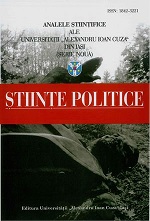Reprezentări ale legitimităţii în dezbaterile privind regalitatea din România în primii ani postdecembrişti: evoluţii, lecturi şi reinterpretări
Forms of Legitimacy in the Debates Concerning the Romanian Royalty in the first post-December Years: Developments, Readings and Reinterpretations
Author(s): Alexandru MuraruSubject(s): Politics / Political Sciences
Published by: Editura Universităţii »Alexandru Ioan Cuza« din Iaşi
Keywords: legitimacy representations; King Michael of Romania; debates; royalty; post-communism; discourse
Summary/Abstract: The article studies different representations of legitimacy as constructed in the debates on Romanian royalty in the first years after December 1989. By making use of historical – in terms of tradition and continuity – political and juridical arguments, the restoration of monarchy is legitimated or deconstructed in the debates of 1990-1991, which took place especially in media. King Michael’s forced abdication and the illegal instauration of the republic in 1947 are the main arguments in stating the historical legitimacy of royalty’s return. This form of legitimacy – the most widely spread at the time (having two central axes: historical tradition of monarchical state and the judicial matter of constitutional continuity) – came in opposition with the revolutionary (personal) and electoral (public) legitimacy of Ion Iliescu, the left-wing leader of the newly installed power in 1989. Two other types of legitimacy judicial and political were brought up in debates; the first one sustained by laws and the normative system while for the second, public will was the central element. Moral legitimacy was embraced only by a small part of the Romanian society. The central-right wing intellectuals saw King Michael as a continuator of the monarchical institution and royalty was seen as a method of morally reviving the Romanian society, while lacking a coherent political programme. Other legitimating arguments were social peace, the political neutrality of the head of the state, the guarantee of a national consensus, the need of rebuilding external credibility, as well as invoking the binomial legitimacy-credibility. The deconstruction of historical legitimacy was, in fact, one of the topics in the polemics embark upon in the 1990s publications. The monarchy restoration scenario was presented from a negative perspective. Therefore, the emergence of strong social conflicts, properties’ retrocession, but also new disputes concerning succession were brought into play. Other sources claimed the incompatibility of democratic regimes with the existence of a monarch.
Journal: Analele Ştiinţifice ale Universităţii »Alexandru Ioan Cuza« din Iaşi. Ştiinţe politice
- Issue Year: 2013
- Issue No: 8
- Page Range: 71-86
- Page Count: 15
- Language: Romanian
- Content File-PDF

